Gallantry Awards are presented for exceptional courage, valor and dignity. In India, the Gallantry Awards are given to the personnel of the forces for their exceptional bravery.
After Independence, the three Gallantry Awards namely the Param Vir Chakra, the Maha Vir Chakra and the Vir Chakra were instituted by the Government of India on 26th January 1950.
Gallantry Awards have been instituted by the Government of India to honour the acts of bravery and sacrifice of the officers/personnel of the Armed Forces, other lawfully constituted Forces and civilians. These gallantry awards are announced twice in a year - first on the occasion of the Republic Day and then on the occasion of the Independence Day.
Types of Gallantry awards
Gallantry Awards are classified into two Categories
- Gallantry in the Face of Enemy
- Gallantry Other than in the Face of Enemy
First Category of Gallantry Awards Comprises of the following Awards
- Param Vir Chakra (PVC)
- Mahavir Chakra (MVC)
- Vir Chakra
Second Category of Gallantry Awards Comprises of the following Awards
- Ashok Chakra
- Kirti Chakra
- Shaurya Chakra
Post-independence, first three gallantry awards namely the Param Vir Chakra, the Maha Vir Chakra and the Vir Chakra were instituted by the Government of India on 26th January, 1950 which were deemed to have effect from the 15th August, 1947.
Thereafter, other three gallantry awards i.e. the Ashoka Chakra Class-I, the Ashoka Chakra Class-II and the Ashoka Chakra Class-III were instituted by the Government of India on 4th January, 1952, which were deemed to have effect from the 15th August, 1947. These awards were renamed as the Ashoka Chakra, the Kirti Chakra and the Shaurya Chakra respectively in January, 1967.
Order of precedence of these awards is the Param Vir Chakra, the Ashoka Chakra, the Mahavir Chakra, the Kirti Chakra, the Vir Chakra and the Shaurya Chakra.
Description of the awards
Param Vir Chakra
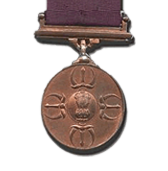
Medal: Circular in shape, made of bronze, one and three eighth inches in diameter and shall have embossed on the obverse four replicas of "Indra's Vajra" with the State Emblem embossed in the centre. On its reverse, it shall have embossed “PARAM VIR CHAKRA” both in Hindi and in English with two lotus flowers between the Hindi and the English inscriptions.
Ribbon: Plain purple coloured ribbon.
Bar: If any recipient of the Chakra shall again perform such an act of bravery as would have made him or her eligible to receive the Chakra, such further act of bravery shall be recorded by a Bar to be attached to the riband by which the Chakra is suspended, and for every such additional act of bravery, an additional Bar shall be added, and any such Bar or Bars may also be awarded posthumously. For every Bar awarded a replica of the "Indra's Vajra" in miniature shall be added to the riband when worn alone.
Mahavir Chakra
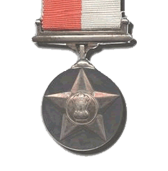
Medal: Circular in shape and of standard silver, one and three eighth inches in diameter, and shall have embossed on the obverse a five-pointed heraldic star with the points of the star just touching the rim. The star shall have in the centre a domed gilded State Emblem. On the reverse, it shall have embossed “MAHA VIR CHAKRA” both in Hindi and in English with two lotus flowers between the Hindi and the English inscriptions.
Ribbon: The ribbon is of a half-white and half-orange colour.
Bar: If any recipient of the Chakra shall again perform such an act of bravery as would have made him or her eligible to receive the Chakra, such further act of bravery shall be recorded by a Bar to be attached to the riband by which the Chakra is suspended, and for every such additional act of bravery, an additional Bar shall be added, and any such Bar or Bars may also be awarded posthumously. For every Bar awarded a replica of the Chakra in miniature shall be added to the riband when worn alone.
Vir Chakra
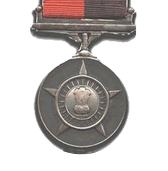
Medal: Circular in shape and of standard silver, one and three eighth inches in diameter, and shall have embossed on the obverse a five-pointed heraldic star with the points of the star just touching the rim. The star shall have in the centre a Chakra and within the Chakra shall be a domed centre piece bearing the gilded State Emblem. On the reverse, it shall have embossed “VIR CHAKRA” both in Hindi and in English with two lotus flowers between the Hindi and the English inscriptions.
Ribbon: The ribbon is of half blue and half orange in colour.
Bar: If any recipient of the Chakra shall again perform such an act of bravery as would have made him or her eligible to receive the Chakra, such further act of bravery shall be recorded by a Bar to be attached to the riband by which the Chakra is suspended, and for every such additional act of bravery, an additional Bar shall be added, and any such Bar or Bars may also be awarded posthumously. For every Bar awarded a replica of the Chakra in miniature shall be added to the riband when worn alone.
Ashoka Chakra
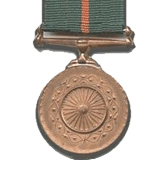
Medal: Circular in shape, one and three eighth inches in diameter, with rims on both sides. The medal shall be of gold gild. On the obverse of the medal shall be embossed a replica of Ashoka’s Chakra in the centre, surrounded by a lotus wreath. Along the rim, on the inner side, shall be a pattern of lotus leaves, flowers and buds. On its reverse shall be embossed the words “Ashok Chakra” both in Hindi and English the two versions being separated by two lotus flowers..
Ribbon: Green colour ribbon divided into two equal segments by an orange vertical line.
Bar: If a recipient of the Chakra shall again perform such an act of gallantry as would have made him or her eligible to receive the Chakra, such further act of gallantry shall be recognised by a Bar to be attached to the riband by which the Chakra is suspended and, for every subsequent act of gallantry, an additional Bar shall be added and any such Bar or Bars may also be awarded posthumously. For every Bar awarded a replica of the Chakra in miniature shall be added to the riband when worn alone.
Kirti Chakra
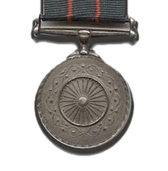
Medal: Circular in shape and of standard silver, one and three-eighth inches in diameter, with rims on both sides. On the obverse of the medal shall be embossed a replica of Ashoka’s Chakra in the centre, surrounded by a lotus wreath. Along the rim, on the inner side, shall be a pattern of lotus leaves, flowers and buds. On its reverse shall be embossed the words “KIRTI CHAKRA” both in Hindi and English, the two versions being separated by two lotus flowers.
Ribbon: Green colour ribbon divided into three equal parts by two orange vertical lines.
Bar: If a recipient of the Chakra shall again perform such an act of gallantry as would have made him or her eligible to receive the Chakra, such further act of gallantry shall be recognised by a Bar to be attached to the riband by which the Chakra is suspended and, for every subsequent act of gallantry, an additional Bar shall be added and such Bar or Bars may also be awarded posthumously. For every such Bar, a replica of the Chakra in miniature shall be added to the riband when worn alone
Shaurya Chakra
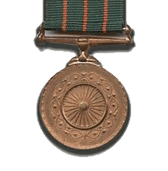
Medal: Circular in shape and made of bronze, one and three-eighth inches in diameter, with rims on both sides. On the obverse of the medal shall be embossed a replica of Ashoka’s Chakra in the centre, surrounded by a lotus wreath. Along the rim, on the inner side, shall be a pattern of lotus leaves, flowers and buds. On its reverse shall be embossed the words “SHAURYA CHAKRA” both in Hindi and English, the two versions being separated by two lotus flowers.
Ribbon: Green colour ribbon divided into four equal parts by three vertical lines.
Bar: If a recipient of the Chakra shall again perform such an act of gallantry as would have made him or her eligible to receive the Chakra, such further act of gallantry shall be recognised by a Bar to be attached to the riband by which the Chakra is suspended and, for every subsequent act of gallantry, an additional Bar shall be added and such Bar or Bars may also be awarded posthumously. For every such Bar, a replica of the Chakra in miniature shall be added to the riband when worn alone.
CRITERIA FOR THE AWARDS
The Param Vir Chakra, The Maha Vir Chakra & The Vir Chakra
The following categories of persons shall be eligible for the Param Vir Chakra, the Maha Vir Chakra and the Vir Chakra:
- Officers and men and women of all ranks of the Naval, Military and Air Forces, of any of the Reserve Forces, of the Territorial Army, Militia and of any other lawfully constituted Armed Forces.
- Matrons, Sisters, Nurses and the Staff of the Nursing Services and other Services pertaining to Hospitals and Nursing, and Civilians of either sex serving regularly or temporarily under the orders, directions or supervision of any of the above-mentioned Forces.
Conditions of Eligibility:
- The Param Vir Chakra is awarded for most conspicuous bravery or some daring or pre-eminent act of valour or self-sacrifice, in the presence of the enemy, whether on land, at sea, or in the air.
- The Maha Vir Chakra is awarded for acts of conspicuous gallantry in the presence of the enemy whether on land, at sea or in the air.
- The Vir Chakra is awarded for acts of gallantry in the presence of the enemy, whether on land or at sea or in the air.
The Ashoka Chakra, The Kirti Chakra & Shaurya Chakra
The following categories of persons shall be eligible for the Ashoka Chakra, the Kirti Chakra and the Shaurya Chakra:
- Officers and men and women of all ranks of the Army, the Navy and the Air Force, of any of the Reserve Forces, of the Territorial Army, Militia and of any other lawfully constituted forces.
- Members of the Nursing Services of the Armed Forces.
- Civilian citizens of either sex in all walks of life and members of Police Forces including Central Para-Military Forces and Railway Protection Force.
Conditions of Eligibility:
- The Ashoka Chakra is awarded for most conspicuous bravery or some act of daring or pre-eminent act of valour or self-sacrifice otherwise than in the face of the enemy.
- The Kirti Chakra is awarded for conspicuous gallantry otherwise than in the face of the enemy.
- The Shaurya Chakra is awarded for gallantry otherwise than in the face of the enemy.
All the gallantry awards may be awarded posthumously.
Persons recommended for the award shall not be involved in any adverse report or should not have been conveyed any displeasure or censure or given any punishment in a court martial proceedings or through administrative action.
Selection process
Ministry of Defence invites recommendations twice in a year from the Armed Forces and Union Ministry of Home Affairs for gallantry awards. Recommendations are invited normally in the month of August for the awards to be announced on the occasion of the Republic Day and in the month of March for the awards to be announced on the occasion of the Independence Day.
In respect of the Armed Forces, a case for the gallantry award is initiated by the Unit and if found fit the same is forwarded to respective Services HQrs duly recommended by Commanders in chain, immediately after the act of gallantry is performed. All such proposals are then considered by the Awards Committee at Services HQrs before recommending the proposals to the Ministry of Defence with the approval of the respective Chiefs.
Recommendations in respect of civilian citizens (other than Defence personnel) are received from the Union Ministry of Home Affairs (MHA). MHA calls for recommendations (in respect of civilians) from all State/UT Governments, Central Ministries/ Departments, Central Armed Police Forces and Railway Protection Force etc. Recommendations received directly from private individuals, including VIP references are not accepted. Recommendations are scrutinized by a Sub-Committee in the MHA and their recommendation is received in the Ministry of Defence with the approval of Union Home Secretary.
Recommendation for gallantry awards is normally required to be sent to the Ministry of Defence as early as possible after the act of gallantry is performed. In any case, the time limit for considering gallantry awards should not be beyond two calendar years from the date on which the act of gallantry is performed.
Recommendations received from the Armed Forces and MHA are considered by the Central Honours & Awards Committee (CH&AC) comprising of Raksha Mantri, three Service Chiefs & Defence Secretary. Home Secretary is also member for the cases recommended by the Ministry of Home Affairs.
Thereafter, recommendations of the CH&AC are submitted for approval of the Prime Minister and the President. After approval of the President, awards are announced on the occasion of the Republic Day and Independence Day.